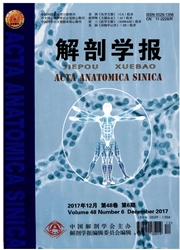

 中文摘要:
中文摘要:
目的探讨细胞周期蛋白依赖性蛋白激酶11(CDK11)在横断性脊髓损伤(tSCI)后的表达变化以及定位情况。方法将36只成年SD大鼠随机分为假手术组,T9横断伤1d、3d、5d、7d和14d组,每组6只。采用Western blotting测法损伤后各时间段CDK11蛋白水平在脊髓中的表达变化。采用免疫组织化学方法检测CDK11在假手术组以及损伤组脊髓中的分布和定位。结果Western blotting显示,CDK11蛋白水平在SCI后呈现先升高后下降的趋势,CDK11^p58的表达于损伤后3d开始显著升高,一直持续到第7d,之后逐渐下降。而CDK11^p110也在3d、5d时高于假手术组,伤后7d则明显降低,至14d时有所回升。免疫组织化学表明,CDK11在假手术组脊髓中均匀分布,损伤后3d,CDK11在脊髓灰质和白质中表达明显增加;免疫荧光双标记表明,CDK11与神经元的标记物神经元核抗原(NeuN)、少突胶质细胞标记物环核苷酸-3'磷酸水解酶(CNPase)有明显共定位,与星形胶质细胞标记物胶质纤维酸性蛋白(GFAP)也存在部分共定位。结论脊髓损伤后CDK11蛋白水平呈现明显的时相变化,并且与神经元、少突胶质细胞和星形胶质细胞存在共定位,提示CDK11参与了脊髓损伤后的病理生理过程。
 英文摘要:
英文摘要:
Objective To explore the expression and distribution of cyelin dependent kinase 11 (CDK11) after transected spinal cord injury (tSCI). Methods tSCI was performed at T9 in adult Sprague-Dawley (SD) rats. The rats were sacrificed lday, 3days, 5days, 7days, 14days after operation respectively. Western blotting was used to detect the changes of CDKll protein expression after tSCI, and the distribution and localization of CDKll in spinal cord were investigated by immunohistochemical staining and immunofluorescence double staining. Results Western blotting analysis showed the expressions of CDK11^p58 and CDK11^p110 , which were the two major isoforms of CDK11, increased at first and then had a decrease tendency in both broken ends of the transected spinal cord. CDK11^p58 was enhanced on the 3rd day and remained high level until the 7th day; while CDK11^p110 was also increased, on the 3rd day but went down rapidly after the 5th day. Immunohistochemistry staining was indicated that CDK11 was distributed evenly in the normal spinal cord. On the 3rd day, the staining was elevated obviously in both white and grey matter. Immunofluorescence double staining suggested that CDK11 was colocalized with neuronal neclei (NeuN), cyclic nucleotide 3'phosphohydrolase (CNPase) and glial fibrillary acidic protein (GFAP). Conclusion The expression of CDK11 undergoes spatiotemporal changes after tSCI. These alterations may be involved in secondary spinal cord lesion such as neuronal apoptosis and proliferation of glial cells.
 同期刊论文项目
同期刊论文项目
 同项目期刊论文
同项目期刊论文
 Altered beta-1,4-galactosyltransferase I expression during early inflammation after spinal cord cont
Altered beta-1,4-galactosyltransferase I expression during early inflammation after spinal cord cont Elevated beta 1,4-galactosyltransferase-I induced by the intraspinal injection of lipopolysaccharide
Elevated beta 1,4-galactosyltransferase-I induced by the intraspinal injection of lipopolysaccharide SSeCKS promote beta-amyloid-induced PC12 cells neurotoxicity by up-regulating tau phosphorylation in
SSeCKS promote beta-amyloid-induced PC12 cells neurotoxicity by up-regulating tau phosphorylation in Cyclin D3/CDK11(p58) Complex Involved in Schwann Cells Proliferation Repression Caused by Lipopolysa
Cyclin D3/CDK11(p58) Complex Involved in Schwann Cells Proliferation Repression Caused by Lipopolysa A Critical Role of Src-Suppressed C Kinase Substrate in Rat Astrocytes After Chronic Constriction In
A Critical Role of Src-Suppressed C Kinase Substrate in Rat Astrocytes After Chronic Constriction In Lipopolysaccharide-evoked HSPA12B expression by activation of MAPK cascade in microglial cells of th
Lipopolysaccharide-evoked HSPA12B expression by activation of MAPK cascade in microglial cells of th The expression patterns of beta 1,4 galactosyltransferase I and V mRNAs, and Gal beta 1-4GlcNAc grou
The expression patterns of beta 1,4 galactosyltransferase I and V mRNAs, and Gal beta 1-4GlcNAc grou 期刊信息
期刊信息
